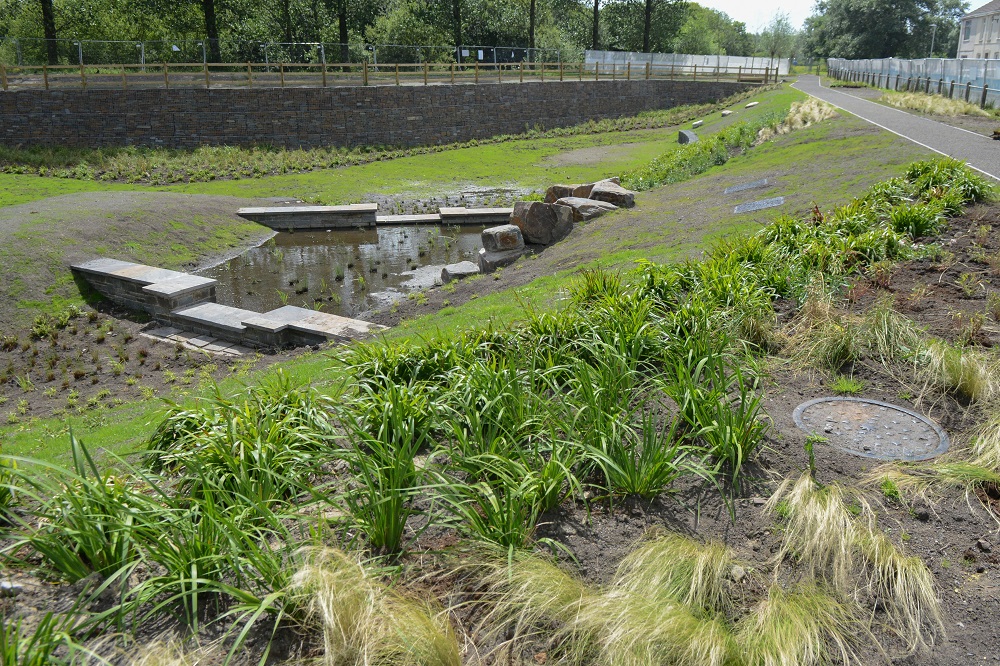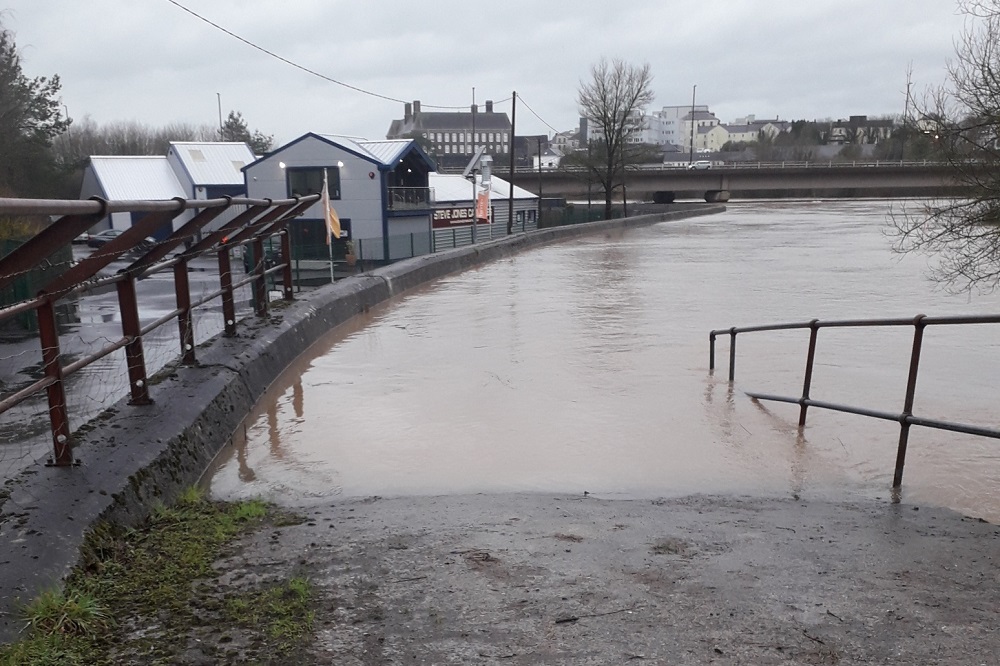Call to reward farmers for reducing the amount of pollution run-off into Welsh rivers

Richard Youle, local democracy reporter
A scheme that rewards farmers for reducing the amount of polluting run-off which washes from fields into rivers should be considered, a Dwr Cymru Welsh Water director has said.
Steve Wilson said he believed the idea had merit and that it would be brought up at this month’s Royal Welsh Show as part of a discussion about problematic river catchment areas where new developments are on hold.
Mr Wilson also felt planning controls should be considered to make it harder for householders to Tarmac their drives, which contributes to more surface water entering the waste water network.
He was speaking to the Local Democracy Reporting Service ahead of a consultation about a new Welsh Water drainage and wastewater management plan – a long-term strategy to reduce the amount of times wastewater and sewage ends up in rivers and the sea.
Councils and other organisations which own drains will be expected to participate fully.
Mr Wilson, Welsh Water’s managing director of waste water services, said combined storm overflow pipes which sent surface water and sewage into rivers and the sea were operating “far more frequently” than it would like.
“Pressure is quite rightly on water companies to sort it out,” he said.
Mr Wilson said any interventions would cost money, and that the Welsh Water had already committed to £800m of environmental improvements over the next five years.
He said everyone had a role in reducing surface water, including householders who added to the problem by covering drives with Tarmac and concrete or replacing lawns with artificial ones, thereby preventing rain from soaking into the ground.
Asked he supported the introduction of planning controls for such projects, Mr Wilson said: “Yes, I think there is a need. Everyone wants to see river water quality improved. Actually we all have a part to play – it’s not just down to water companies.”
Terraced streets
He said new developments had to separate surface water from sewage pipes from the outset. What was harder, he said, was intervening in built-up areas, with Llanelli a case in point.
Mr Wilson said more surface water used to enter the sewer network in the Carmarthenshire town than its much bigger neighbour across the Loughor bridge, Swansea, before a £116m Welsh Water project.
This was a legacy, he said, of Llanelli having a higher concentration of terraced streets and fewer green areas compared to Swansea.
The RainScape project diverted surface water from the sewer network in Llanelli via a large pipe running eight metres under Station Road and into the estuary.
Shallow channels of vegetation, called swales, were installed to soak up water. Upgrades were also carried out at nearby Gowerton.
Mr Wilson said combined storm overflow pipes in Llanelli now operated 10 to 20 times a year, compared to 60 to 80 – sometimes more – prior to RainScape, and that water quality in the estuary had improved.
Eradicating all storm overflow discharges, he said, would literally involve intercepting rainwater at every individual property.

Rainfall events
Combined storm overflows act as relief valves during heavy rain, preventing homes and businesses from being flooded, although in severe instances the system can become overwhelmed.
Mr Wilson said Wales usually experienced one, two or three one-in-50-year rainfall events per year, but this is increasing due to climate change to four or five and potentially six or seven by 2050.
This rainfall intensity has to be factored into the long-term drainage and wastewater plan.
Conversely, warmer and drier and summers can compound pollution damage to rivers because there was less water in them to dilute it.
Mr Wilson said Welsh Water worked well with councils which were badly affected by Storm Dennis in February 2020, and that it had a “fantastic” relationship with Cardiff Council.
Swansea Council, he said, “has been a little bit harder but by no means the worst”.
He added the ownership of drains, pipes and culverts was fragmented, with councils owning some for example. He said it wasn’t uncommon for car parks to be connected to the sewer network although they shouldn’t be.
Phosphate levels
Meanwhile Natural Resources Wales (NRW) has responsibility for main river flooding.
NRW is worried phosphates from agricultural run-off and household and industrial developments are damaging river water quality.
It has published targets to reduce river phosphate levels in special areas of conservation (SACs) in Wales.
Just over 60% of waterbodies in Wales fail the stricter targets – mostly in mid and south Wales – and councils have been asked to take more action.
Any proposals for development within SAC river catchments must now prove the scheme will not contribute to increased phosphate levels.
The situation has left planning applications in limbo in these areas, including parts of Carmarthenshire, Ceredigion, Pembrokeshire and Powys.
Carmarthenshire is having to amend its emerging development plan for the county because of the phosphate issue, and may even have to strike off some housing proposed in affected catchment areas.
Councils have set up so-called nutrient management boards, which will develop a management plan and actions in order to achieve conservation targets defined by NRW for the river Tywi, Teifi, Cleddau and Wye SACs.

Phosphate stripping technology
Carmarthenshire Council has launched a “phosphate calculator” to help developers calculate and mitigate the a development’s phosphate impact.
One option might be fit to all water treatment works in these areas with phosphate-stripping technology, although some already have it.
Mr Wilson said Welsh Water had 164 sewage works in river SACs and that it was adding phosphate stripping to 11 of them on the Wye, and planned to bring forward plans for others.
But he said doing so at smaller sewage works serving smaller communities made less environmental and financial sense, especially in rural areas where 60% to 70% of nutrient run-off came from agriculture.
Mr Wilson said offering farmers money to reduce run-off by using less fertiliser, for example, or by planting the edge of their riverside fields with trees, could be a better option.
He said this “catchment permit” idea would be discussed at the the Royal Welsh Show in a meeting called by First Minister Mark Drakeford.
“It is very tricky,” said Mr Wilson. “If you were to say use less fertilisers, or stock fields less, it’s harder (for farmers) to make ends meet. We are trying to have these discussions with agriculture.”
Ecological status
He pointed out there has been a lot of investment and improvements over the years, and that some coastal areas didn’t have any sewage treatment works until as recently as the 1990s.
He said Wales had 15% of the UK’s coastline but more than twice a higher proportion of Blue Flag beaches. He said 46% of Wales’s rivers met “good” ecological status, compared to 14% in England.
Asked if he would swim in rivers in Wales, Mr Wilson, who lives in Pontarddulais, said he had a couple of kayaks and used them in rivers while family members used stand-up paddle boards.
Welsh Water bills are rising by an average around £20 – or 3.9% – for metered customers this year. The increase is higher for households without a meter.
The not-for-profit utility has 1.4 million household and business customers, including some in England, and is owned by Glas Cymru.
It is the subject of three current Environment Agency investigations in England, the agency said.
Mr Wilson said wastewater reduction measures would take a long time to deliver and had to be affordable.
“The water industry can deliver whatever service levels customers want it to, but it comes at a price,” he said.
Ofwat comments
When asked about the new drainage and wastewater management plans being published by water companies in England and Wales, a spokesman for water regulator Ofwat said: “It’s important that wastewater companies understand the public concern around pollution and climate change and ensure that they comply with their legal obligations.
“We welcome the publication of the plans, which are an important step in reducing pollution incidents and addressing the impact of climate change and population growth, while ensuring the resilience of drainage and wastewater services.
“The plans will give Ofwat greater insight into companies’ long term drainage and wastewater strategies, including how they plan to collaborate with other key stakeholders to maintain or improve services. During the consultation period, we will scrutinise the draft DWMPs and respond to each company accordingly on the quality and ambition of their plans.”
When asked how significant the plans might be to customers’ water bills, the watchdog said it would consider affordability when assessing company business plans, adding that any numbers presented in the plans will be draft at this stage.
The impact on bills will not be understood fully until companies balance their requirements against other parts of their business plans for the next price review period (2025-29) and a final determination is expected in late 2024.
Support our Nation today
For the price of a cup of coffee a month you can help us create an independent, not-for-profit, national news service for the people of Wales, by the people of Wales.





